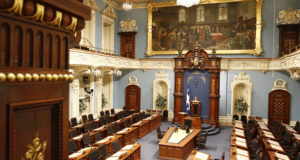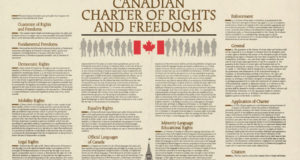I had the real privilege today of appearing on Your Morning on CTV to chat about the notwithstanding clause with host Ben Mulroney. In particular, we discussed the threat of premier-designate, François Legault to invoke s.33 of the Charter preemptively in legislation that would ban public servants and officials from wearing religious symbols.
The full interview can be accessed here.
For obvious reasons, many are drawing parallels between Mr. Legault’s threatened use of s.33 and Ontario’s recent near-invocation of the clause. However, I believe two distinctions can be drawn between them, one legal and the other philosophical.
With respect to the first, Ontario’s law was initially struck down only on the grounds that it offended freedom of expression under s2(b). Quebec’s law, by contrast, is problematic not only on Charter grounds, but on other constitutional grounds to which the notwithstanding clause does not apply. The first of these, as others have pointed out, is the constitutional principle of judicial independence. That the law would apply to judges in the province strikes me as a clear violation of judicial independence, as it seeks to impose ideological conformity upon the judiciary.
Even if the law could be read down to exclude judges, the other potential problem is that, in pith and substance, it is a law concerning religious freedom and observance, which arguably falls under Parliament’s exclusive jurisdiction. This would candidly be a difficult argument to litigate since most of the so-called “implied bill of rights” cases concerned a law that clearly amounted to criminal legislation, which is Parliament’s sole purview under s.91(27) of the Constitution Act, 1867. It would be a stretch to classify the Quebec proposal as criminal law. On the other hand, in his concurring opinion in Saumur v Quebec, which the Court may have endorsed in R v. Big-M Drug Mart, Justice Rand articulated the view that any law whose purpose is aimed at controlling religious observance necessarily falls outside provincial competence as it does not concern a “civil right” in the province under 92(13) of the Act, but is rather an “original freedom” (and would therefore presumably fall under the federal Peace, Order and Good Government residual power). If the Court were to adopt this more constrained view of provincial jurisdiction (which is admittedly unlikely in the era of “co-operative federalism”), it could fairly conclude that a law prohibiting individuals from wearing religious symbols is beyond provincial authority.
The Quebec and Ontario cases are also different on a philosophical level. Whereas Ontario’s near-invocation of s.33 came on the heels of a court decision that almost all commentators agreed was wrongly decided (and that the Court of Appeal subsequently all but overruled), the consensus among legal scholars is that Quebec’s law would amount to a gross violation of freedom and equality of religion, and likely freedom of expression as well.
And this leads me to ponder further the question of when it is politically and philosophically legitimate to invoke the notwithstanding clause (assuming the answer is something other than never). Professor Dwight Newman undertook this very analysis in a recently-published paper, which can be accessed here. Picking up on some of his ideas, in my view there are two basic scenarios when invoking the clause can be justified: 1) when there is a plausible alternative interpretation of a Charter right, and 2) where there is a significant societal concern and especially one that a court may not appreciate. Put another way, the legislature must be able to plausibly argue that a Court was incorrect either in its understanding of the right at issue, or in its section 1 analysis. Regardless of the reason, the government should appeal the unfavourable decision concurrently, which, if successful, renders the use of the notwithstanding clause moot, and if unsuccessful, puts greater political pressure on the government to reconsider its position.
In my view, Ontario’s invocation more or less met this standard. While the government never properly articulated a clear theory of constitutional interpretation, the premier referred from the very beginning to the opinion of the vast majority of legal scholars that the Superior Court’s decision was incorrect. The government subsequently sought a stay of the decision, and the Court of Appeal took the unusual step of pronouncing on the merits and making significant findings in the government’s favour. While the government’s conduct should hardly be held up as the model of a proper s.33 invocation, it was not the flagrant violation of constitutional norms and customs that some have claimed.
By contrast, there is no plausible interpretation of freedom of religion that can be used to justify Quebec’s proposed law, nor is there any pressing societal concern. The premier-designate appears to appreciate, as evidenced by the fact that he has threatened to invoke the notwithstanding clause preemptively, prior to any court decision even being rendered.
Inherent in the concept of religious freedom, and in all section 2 freedoms, is the idea that people must be free to express their individuality. The proposal is nothing short of a brazen assault on individuality, grounded not in state neutrality toward religion but in state hostility. Indeed, while many Quebec politicians have appealed to the value of “secularism,” this law and others like it are not premised on secularism at all, properly understood, but rather on a kind of state atheism, which is anathema not only to the Charter, but to this country’s longstanding legal and philosophical traditions.
* * *
I will be speaking about these issues and more at an upcoming Runnymede Society debate entitled Ford Nation, Notwithstanding. The debate will take place on October 9, 2018 between 12:30pm-2pm at the University of Toronto Faculty of Law (Room J125, Jackman Law Building). As with all Runnymede events, I am very much looking forward to this one!
 Advocates for the Rule of Law
Advocates for the Rule of Law



